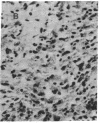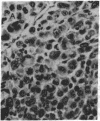Abstract
Normal rat kidney cells were nonproductively infected either with CP27, a mutant of Moloney sarcoma virus that is temperature-sensitive for maintenance of transformation, or with the parental wild-type virus. The nonproducer cells were inoculated into the tails of athymic nude mice that were subsequently incubated at 28 or 36 degrees C. CP27-infected cells induced tumors only at 28 degrees C, whereas cells infected with wild-type Moloney sarcoma virus were tumorigenic at both temperatures. Tumors induced at 28 degrees C by wild-type virus-infected cells grew faster after shift of the mice to 36 degrees C. In contrast, tumors induced by CP27-infected cells regressed upon shift to 36 degrees C, indicating that continuous expression of viral functions is required for persistence and growth of the tumors. After regression, secondary tumor growth was observed late after upshift of temperature-sensitive tumors. Cells recovered from these late-appearing tumors were tumorigenic at the nonpermissive temperature, and tumors induced by these cells did not regress after upshift. Virus rescued from these recovered cells retained the temperature-sensitivity for focus formation, indicating that the occurrence of the phenotypically wild-type cells was due to host cell modifications rather than to reversion of the CP27 genome.
Full text
PDF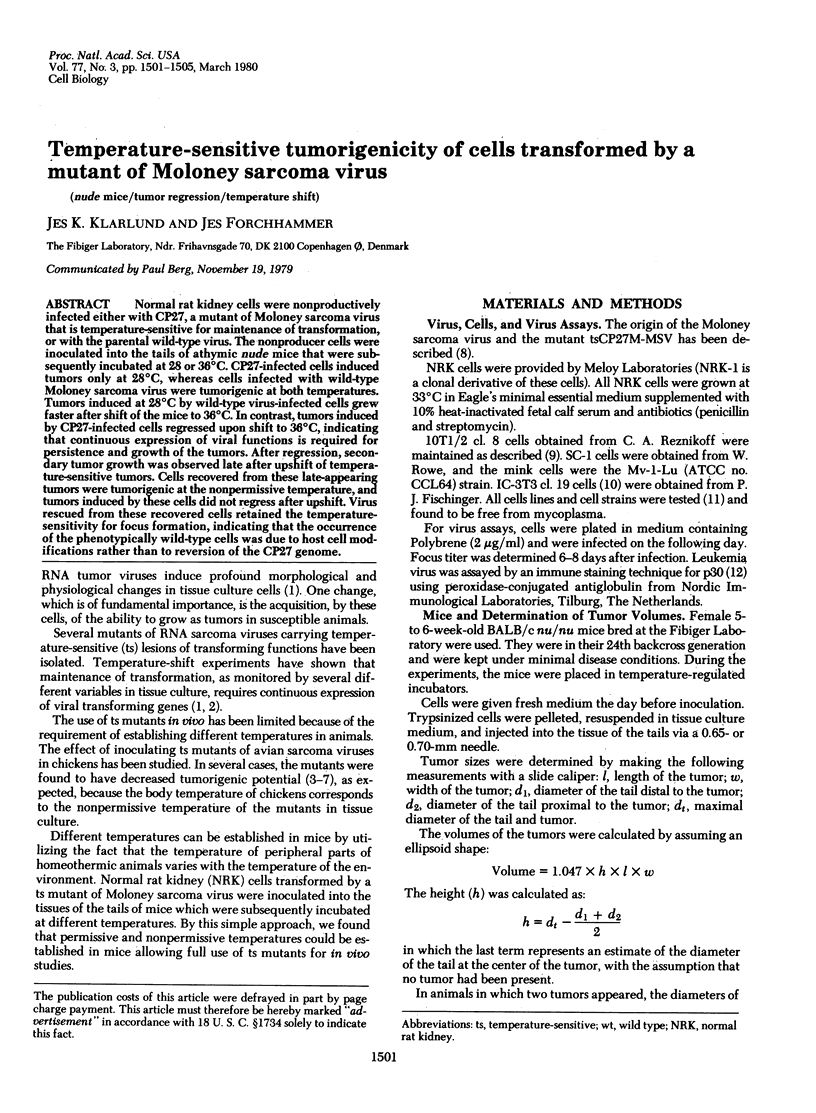
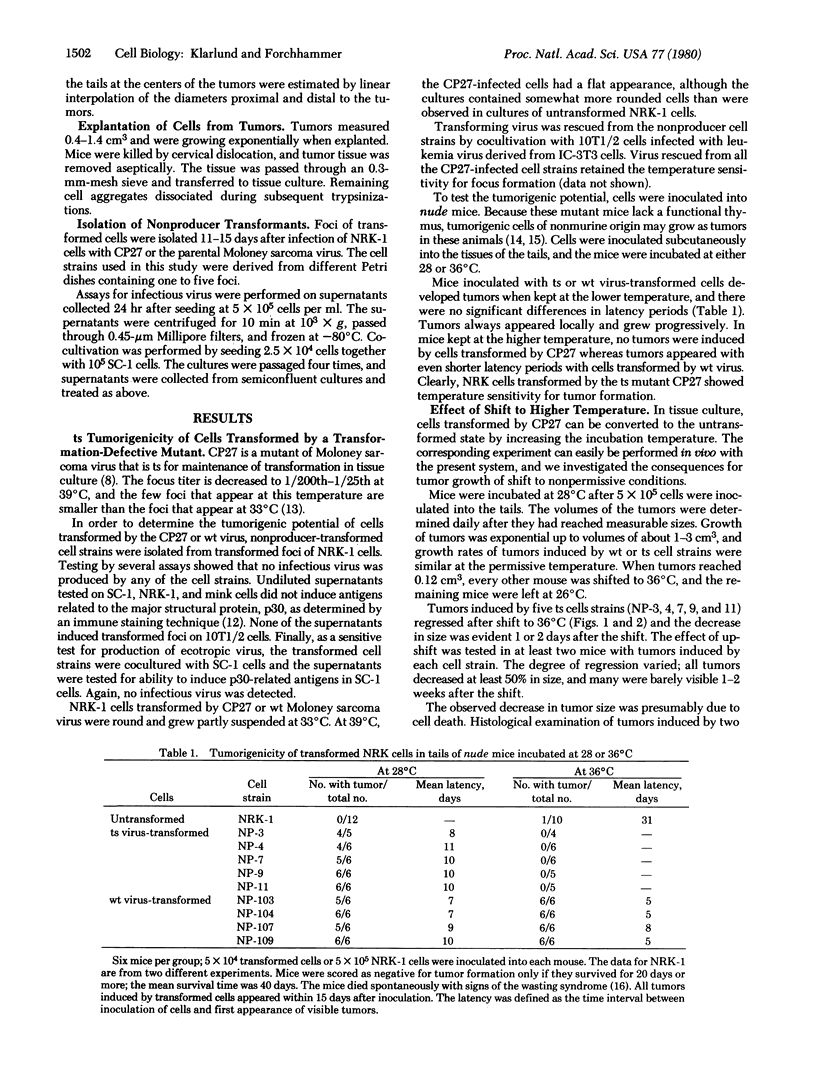
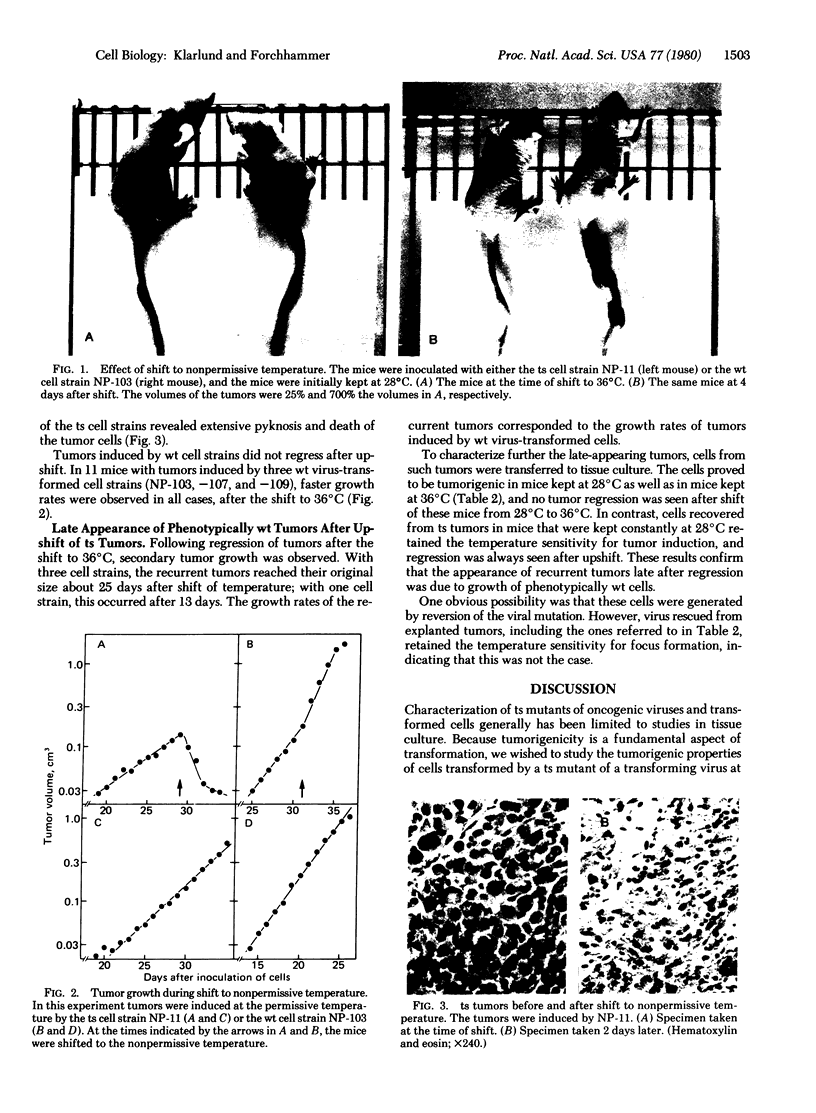
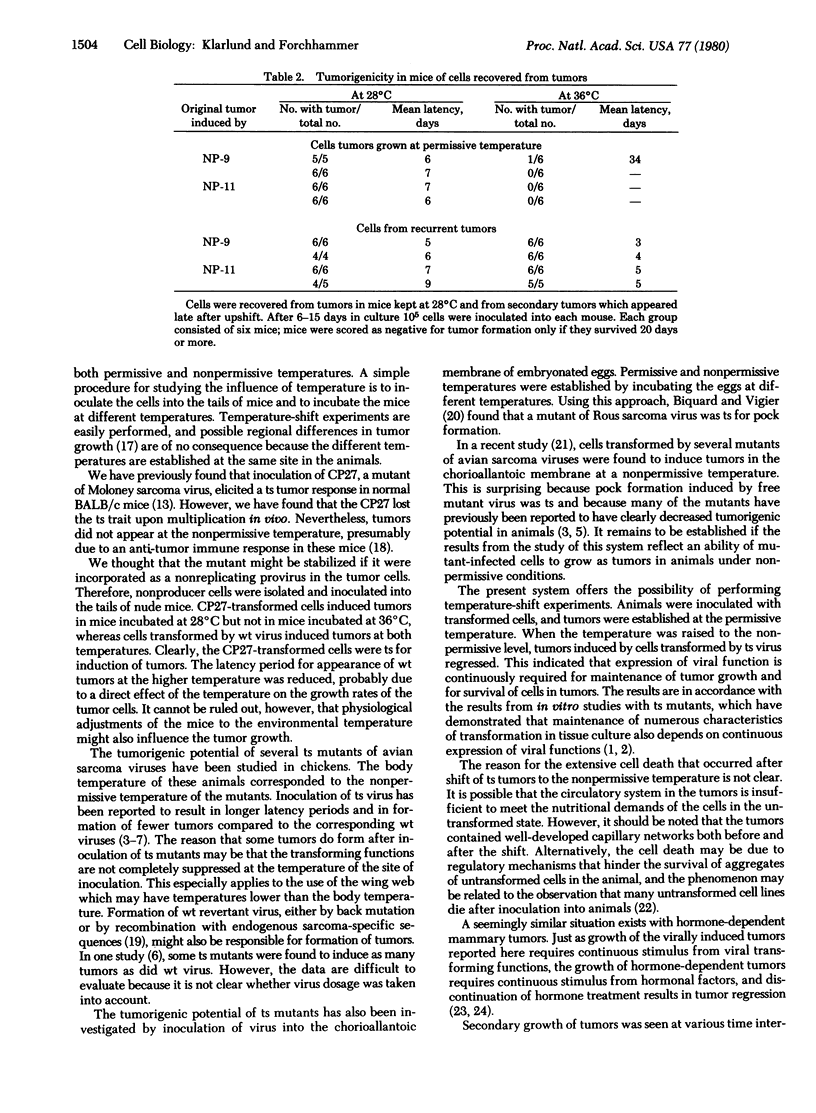
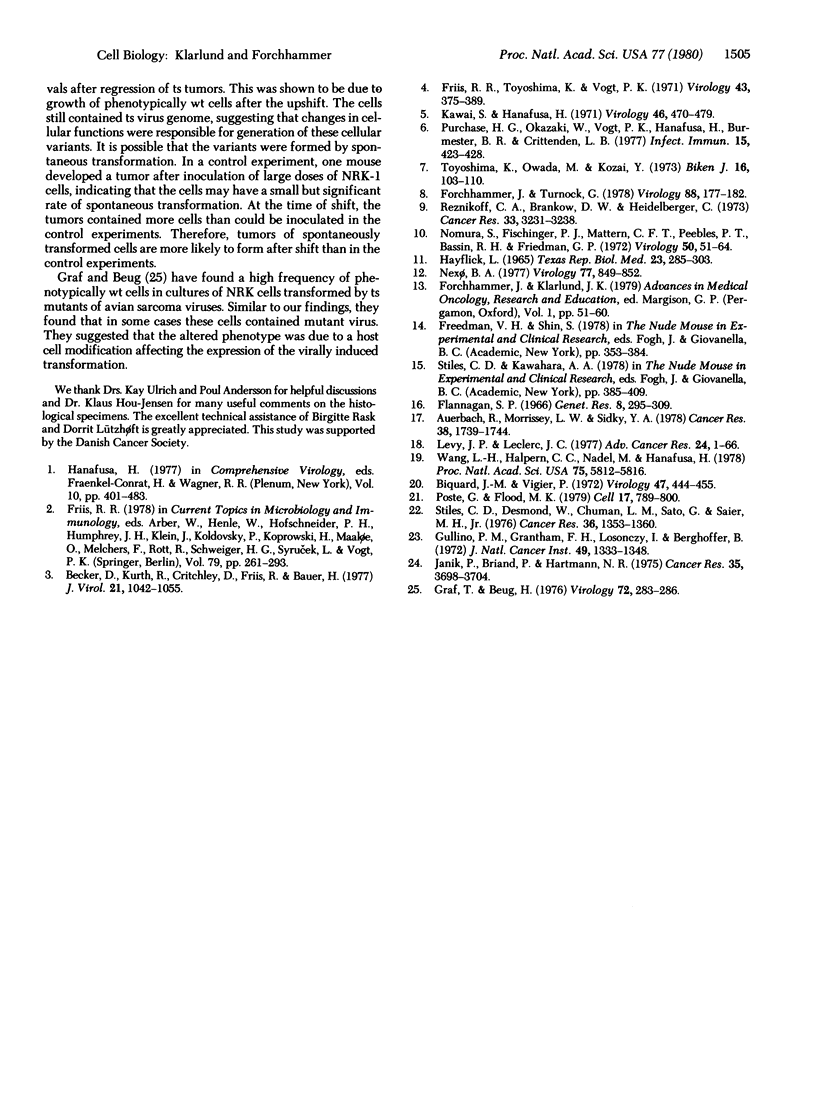
Images in this article
Selected References
These references are in PubMed. This may not be the complete list of references from this article.
- Auerbach R., Morrissey L. W., Sidky Y. A. Regional differences in the incidence and growth of mouse tumors following intradermal or subcutaneous inoculation. Cancer Res. 1978 Jun;38(6):1739–1744. [PubMed] [Google Scholar]
- Becker D., Kurth R., Critchley D., Friis R., Bauer H. Distinguishable transformation-defective phenotypes among temperature-sensitive mutants of Rous sarcoma virus. J Virol. 1977 Mar;21(3):1042–1055. doi: 10.1128/jvi.21.3.1042-1055.1977. [DOI] [PMC free article] [PubMed] [Google Scholar]
- Biquard J. M., Vigier P. Characteristics of a conditional mutant of Rous sarcoma virus defective in ability to transform cells at high temperature. Virology. 1972 Feb;47(2):444–455. doi: 10.1016/0042-6822(72)90280-2. [DOI] [PubMed] [Google Scholar]
- Flanagan S. P. 'Nude', a new hairless gene with pleiotropic effects in the mouse. Genet Res. 1966 Dec;8(3):295–309. doi: 10.1017/s0016672300010168. [DOI] [PubMed] [Google Scholar]
- Forchhammer J., Turnock G. Glycoproteins from murine C-type virus are more acidic in virus derived from transformed cells than from nontransformed cells. Virology. 1978 Jul 1;88(1):177–182. doi: 10.1016/0042-6822(78)90121-6. [DOI] [PubMed] [Google Scholar]
- Friis R. R., Toyoshima K., Vogt P. K. Conditional lethal mutants of avian sarcoma viruses. I. Physiology of ts 75 and ts 149. Virology. 1971 Feb;43(2):375–389. doi: 10.1016/0042-6822(71)90310-2. [DOI] [PubMed] [Google Scholar]
- Graf T., Beug H. A novel type of cellular variant with altered expression of virus-induced cell transformation. Virology. 1976 Jul 1;72(1):283–286. doi: 10.1016/0042-6822(76)90332-9. [DOI] [PubMed] [Google Scholar]
- Gullino P. M., Grantham F. H., Losonczy I., Berghoffer B. Mammary tumor regression. I. Physiopathologic characteristics of hormone-dependent tissue. J Natl Cancer Inst. 1972 Nov;49(5):1333–1348. [PubMed] [Google Scholar]
- Janik P., Briand P., Hartmann N. R. The effect of estrone-progesterone treatment on cell proliferation kinetics of hormone-dependent GR mouse mammary tumors. Cancer Res. 1975 Dec;35(12):3698–3704. [PubMed] [Google Scholar]
- Kawai S., Hanafusa H. The effects of reciprocal changes in temperature on the transformed state of cells infected with a rous sarcoma virus mutant. Virology. 1971 Nov;46(2):470–479. doi: 10.1016/0042-6822(71)90047-x. [DOI] [PubMed] [Google Scholar]
- Levy J. P., Leclerc J. C. The murine sarcoma virus-induced tumor: exception or general model in tumor immunology? Adv Cancer Res. 1977;24:1–66. doi: 10.1016/s0065-230x(08)61012-x. [DOI] [PubMed] [Google Scholar]
- Nexo B. A. A plaque assay for murine leukemia virus using enzyme-coupled antibodies. Virology. 1977 Apr;77(2):849–852. doi: 10.1016/0042-6822(77)90504-9. [DOI] [PubMed] [Google Scholar]
- Nomura S., Fischinger P. J., Mattern C. F., Peebles P. T., Bassin R. H., Friedman G. P. Revertants of mouse cells transformed by murine sarcoma virus. I. Characterization of flat and transformed sublines without a rescuable murine sarcoma virus. Virology. 1972 Oct;50(1):51–64. doi: 10.1016/0042-6822(72)90345-5. [DOI] [PubMed] [Google Scholar]
- Poste G., Flood M. K. Cells transformed by temperature-sensitive mutants of avian sarcoma virus cause tumors in vivo at permissive and nonpermissive temperatures. Cell. 1979 Aug;17(4):789–800. doi: 10.1016/0092-8674(79)90319-2. [DOI] [PubMed] [Google Scholar]
- Purchase H. G., Okazaki W., Vogt P. K., Hanafusa H., Burmester B. R., Crittenden L. B. Oncogenicity of avian leukosis viruses of different subgroups and of mutants of sarcoma viruses. Infect Immun. 1977 Feb;15(2):423–428. doi: 10.1128/iai.15.2.423-428.1977. [DOI] [PMC free article] [PubMed] [Google Scholar]
- Reznikoff C. A., Brankow D. W., Heidelberger C. Establishment and characterization of a cloned line of C3H mouse embryo cells sensitive to postconfluence inhibition of division. Cancer Res. 1973 Dec;33(12):3231–3238. [PubMed] [Google Scholar]
- Stiles C. D., Desmond W., Chuman L. M., Sato G., Saier M. H. Growth control of heterologous tissue culture cells in the congenitally athymic nude mouse. Cancer Res. 1976 Apr;36(4):1353–1360. [PubMed] [Google Scholar]
- Toyoshima K., Owada M., Kozai Y. Tumor producing capacity of temperature sensitive mutants of avian sarcoma viruses in chicks. Biken J. 1973 Sep;16(3):103–110. [PubMed] [Google Scholar]
- Wang L. H., Halpern C. C., Nadel M., Hanafusa H. Recombination between viral and cellular sequences generates transforming sarcoma virus. Proc Natl Acad Sci U S A. 1978 Dec;75(12):5812–5816. doi: 10.1073/pnas.75.12.5812. [DOI] [PMC free article] [PubMed] [Google Scholar]





